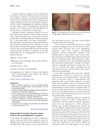 6 citations,
August 2013 in “Joint Bone Spine”
6 citations,
August 2013 in “Joint Bone Spine” Tocilizumab treatment was associated with significant hair regrowth in one patient and temporary hair loss followed by regrowth in another.
 196 citations,
June 2008 in “International Journal of Dermatology”
196 citations,
June 2008 in “International Journal of Dermatology” Dermoscopy helps diagnose and manage alopecia areata by showing specific hair changes.
 22 citations,
January 2002 in “Treatments in endocrinology”
22 citations,
January 2002 in “Treatments in endocrinology” Birth control pills help treat skin and hair growth problems linked to high male hormone levels.
 16 citations,
March 2016 in “Clinical ophthalmology”
16 citations,
March 2016 in “Clinical ophthalmology” Bimatoprost is safe and improves eyelash growth in healthy kids but not in those with eyelash loss from chemotherapy or alopecia.
 77 citations,
June 2017 in “Advances in Therapy”
77 citations,
June 2017 in “Advances in Therapy” New treatments for Alopecia Areata, like JAK inhibitors, show promise for hair regrowth and are likely to change future treatment approaches.
 9 citations,
December 1981 in “International Journal of Dermatology”
9 citations,
December 1981 in “International Journal of Dermatology” The document concludes that early diagnosis is key for treating common baldness in women, but reassurance is often the best approach as hair thinning can be a normal part of aging.
 December 2016 in “John Wiley & Sons, Ltd eBooks”
December 2016 in “John Wiley & Sons, Ltd eBooks” The document concludes that proper recognition and treatment of skin appendage disorders are important for management.
 141 citations,
September 2016 in “European Journal of Dermatology”
141 citations,
September 2016 in “European Journal of Dermatology” Taxane chemotherapy can cause skin, hair, and nail side effects, which are often under-reported and can affect patient quality of life.
 5 citations,
October 2022 in “BMC genomics”
5 citations,
October 2022 in “BMC genomics” Certain microRNAs are important for sheep hair follicle development and could help improve wool quality.
 21 citations,
November 2022 in “Frontiers in immunology”
21 citations,
November 2022 in “Frontiers in immunology” Sebaceous glands play a key role in skin health, immunity, and various skin diseases.
 September 2004 in “Experimental dermatology”
September 2004 in “Experimental dermatology” Melatonin directly affects mouse hair follicles and may influence hair growth.
 October 2024 in “Journal of Education Health and Sport”
October 2024 in “Journal of Education Health and Sport” Alopecia areata treatment should be personalized, using topical or systemic therapies based on severity, with promising options like JAK inhibitors needing more research.
 July 2024 in “Biomolecular and Health Science Journal”
July 2024 in “Biomolecular and Health Science Journal” Mycophenolic acid effectively improved hair and nail growth in a lupus patient.
 51 citations,
October 2002 in “British Journal of Dermatology”
51 citations,
October 2002 in “British Journal of Dermatology” Finasteride increases hair density in female androgenetic alopecia, but individual results may vary.
26 citations,
May 2016 in “Journal of biological chemistry/The Journal of biological chemistry” sPLA2-IIE is crucial for normal hair follicle structure and skin health.
 3 citations,
May 2011 in “Journal of the American Academy of Dermatology”
3 citations,
May 2011 in “Journal of the American Academy of Dermatology” A woman's excessive hair growth around a leg ulcer was linked to a treatment with Prostaglandin E1 ointment.
 87 citations,
December 2016 in “British journal of dermatology/British journal of dermatology, Supplement”
87 citations,
December 2016 in “British journal of dermatology/British journal of dermatology, Supplement” Cancer patients treated with immune checkpoint inhibitors may develop alopecia, but some hair regrowth is possible with treatment.
 1 citations,
March 2023 in “Phytochemistry Reviews”
1 citations,
March 2023 in “Phytochemistry Reviews” CBD may improve skin and hair health, but its effective use and safety need more research.
45 citations,
June 2018 in “Frontiers in immunology” MDSC-Exo can treat autoimmune alopecia areata and promote hair regrowth in mice.
 1 citations,
July 2014 in “Nepal journal of dermatology, venereology & leprology”
1 citations,
July 2014 in “Nepal journal of dermatology, venereology & leprology” Patients with chronic kidney disease on hemodialysis often have skin problems.
January 2023 in “International Journal of Trichology” The hemp extract significantly increased hair regrowth in both men and women without any side effects.
69 citations,
April 2010 in “Clinical ophthalmology” Bimatoprost is effective for growing longer, thicker, and darker eyelashes.
 January 2017 in “Springer eBooks”
January 2017 in “Springer eBooks” The document explains various skin conditions and their treatments.
 25 citations,
February 2022 in “JAAD International”
25 citations,
February 2022 in “JAAD International” Some COVID-19 patients lose hair, with the most common type linked to male hormones and possibly increasing the risk of severe illness.
 8 citations,
June 2021 in “Journal of Cosmetic Dermatology”
8 citations,
June 2021 in “Journal of Cosmetic Dermatology” The review found that COVID-19 can cause skin problems, including rashes and issues from wearing PPE, and suggests more research and protective measures for healthcare workers.
 April 2024 in “JEADV clinical practice”
April 2024 in “JEADV clinical practice” Upadacitinib significantly improved both rheumatoid arthritis and alopecia areata in a patient.
 9 citations,
May 2005 in “Expert Review of Clinical Immunology”
9 citations,
May 2005 in “Expert Review of Clinical Immunology” Blocking interferon-gamma might help treat various autoimmune diseases.
 165 citations,
January 2014 in “Dermatology Research and Practice”
165 citations,
January 2014 in “Dermatology Research and Practice” Zinc is effective for treating various skin conditions, including warts and acne.
 2 citations,
August 2023 in “Autophagy”
2 citations,
August 2023 in “Autophagy” Autophagy helps control skin inflammation and cancer responses and regulates hair growth by affecting stem cell activity.
20 citations,
January 2019 in “International journal of trichology” People with Alopecia areata often have lower Vitamin D levels, which might affect the severity of their condition.

























